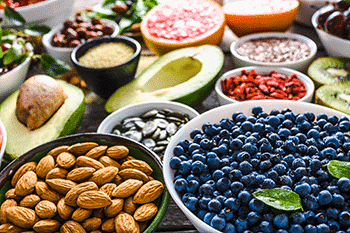How Does Proper Nutrition Affect Wound Healing?
The adage “feed a fever, starve a cold” is often frowned upon by medical professionals. The truth is, no matter what kind of illness you may have — from a simple cold to a full blown flu or even worse — your body needs extra calories and proper nutrition to fight it off.

The same goes when you’re healing from a wound. Without enough energy and proper nutrients, your body won’t have what it needs to expedite wound healing and fight off infection. Keep reading to learn what nutrients your body needs for wound healing, how each of those nutrients aids the wound healing process, and how to intake those nutrients.
(Important note: If you have diabetes, kidney disease, or special dietary restrictions, please consult with your doctor or dietician for a nutrition guide.)
1. Protein
There are four stages of wound healing: Hemostasis, inflammation, proliferation, and maturation. Protein is essential during all four of these phases. It supports platelet function, which is essential for the blood clotting process during hemostasis. Protein also helps form lymphocytes (white blood cells), which are necessary to stave off infection during the inflammation phase. During the proliferation phase, the body needs to form new collagen, form new vasculature, and stimulate fibroblast proliferation — all of which protein helps with. And during the final phase (maturation), protein helps with wound remodeling.
High protein foods include the following:
- Meat
- Cheese
- Eggs
- Tofu
- Yogurt
- Whey
- Lentils
2. Vitamin A
Vitamin A helps to stave off infection when you get wounded. It also helps promote healthy skin.
Foods that are high in vitamin A include the following:
- Carrots
- Milk
- Cheese
- Eggs
- Leafy Greens
- Mango
- Apricots
- Sweet potato
3. Vitamin C
Vitamin C helps to stabilize collagen and promotes healthy skin. It also works to control free radical metabolism, which can impair the healing process.
Foods that are high in vitamin C include the following:
- Broccoli
- Strawberries
- Citrus fruits (lemons, limes, oranges)
- Kiwi
- Peppers
- Potatoes (with the skin)
4. Zinc
Zinc helps your body synthesize proteins and grow and proliferate cells. It also supports immune response to help fight off infection, helps with blood clotting, and helps your body pull vitamin A from your liver.
Foods that are high in zinc include the following:
- Eggs
- Seafood
- Poultry
- Whole grains
- Meat
- Milk
- Beans
- Lentils
5. Fluids
Getting enough fluids is important even when you’re healthy, but it’s even more important when your body is healing. Fluids serve as a solvent for amino acids, glucose, vitamins, and minerals so that your body can more readily make use of these things during the healing process.
Can I Take Supplements for My Vitamin Intake?
Multivitamins and other supplements may be helpful at times, but there can be significant drawbacks to getting your nutrients from supplements instead of food. Dietary supplements are not regulated by the FDA. They may contain too little of the nutrients you need, or they may contain way too much, thus resulting in vitamin toxicity.
The other potential drawback is that if you simply add vitamins to your diet and nothing else, you may not meet your increased caloric needs while healing.
How Many More Calories Do I Need While Healing?
Everyone’s body is different, and wounds can vary greatly as well. For these reasons, there’s no exact guide for how many extra calories you’ll need while healing. In most cases, however, your body will let you know when it needs additional fuel. Keep healthy snacks accessible throughout the day so that you can nourish your body when necessary.
It’s also important that you consume fats and carbohydrates in addition to proteins while you’re healing. Carbohydrates help ensure that your body gets the glucose it needs to facilitate healing, and fats help modulate inflammation and immune response.
Proper nutrition is one of the many tools that helps with the wound healing process. Other tools include proper wound dressing and wound cleansers.
To view an innovative portfolio of surgical products, please visit https://sanaramedtech.com/surgical/




